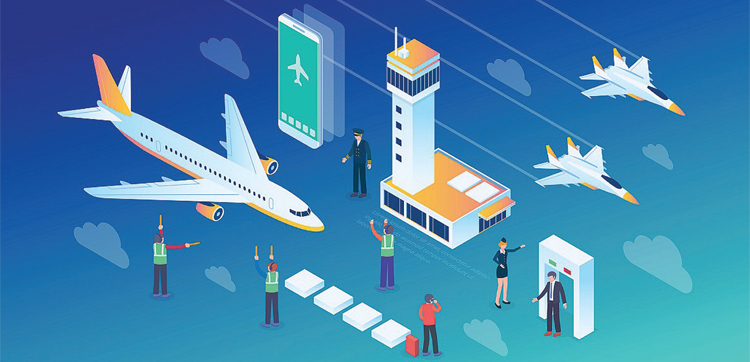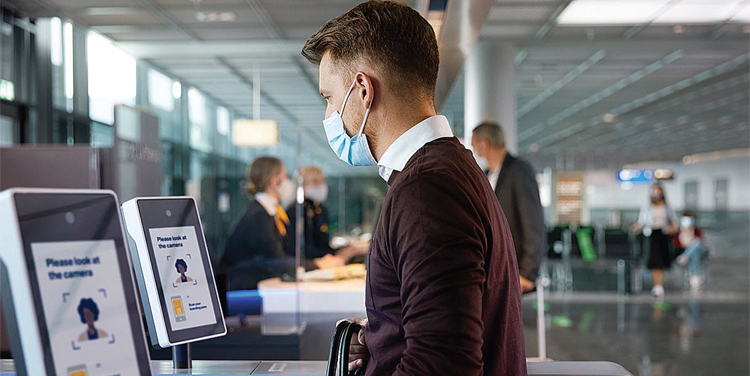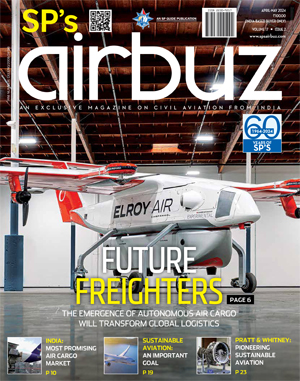Travel Transitions in 2021
From contactless checkin to biometric gateways, cabin cleaning, increased collaboration, domestic travel, common travel digital passport, travelling in 2021 and beyond comes decked up with innovations

While 2020 will certainly be remembered for the pandemic, stalled travel operations, and the challenging year that it was, it also was a year synonymous with adaptability, innovation. As operations start to resume, there is a new normal that everyone is getting accustomed to. From social-distancing to contactless activities, from thermal scanning devices to masks and face shields, travel has some new rules attached. As the industry begins operations with the hope for recovery, we look at some of the trends that are and will transform air travel in 2021.
CABIN CARE
As hygiene becomes the top most concern for any airline to gain passenger confidence, transformations in cabin cleanliness with advanced and frequent technological innovations. There has been a spotlight on the HEPA (High-efficiency particulate air) filters that are said to deliver the standard of air quality normally found in hospital operating theatres. Certain airlines are also considering to introduce separators, dividers or head shields attached to the seat as well as enhanced cleaning services to disinfect the cabins. Increasingly, more airlines like Qatar Airways and JetBlue are turning to ultraviolet cabin cleaning system. One of the examples of this system is the UV Cabin System, developed by Honeywell. It is a portable ultraviolet-c light (UVC) device that is roughly the size of an aircraft beverage cart, can cover an entire mid-sized airline cabin in less than 10 minutes.
INCREASE IN DOMESTIC TOURISM & REGIONAL CONNECTIVITY
As international travel still remains suspended in some parts of the world, domestic tourism is gathering popularity and preference among travelers. With this regional airlines are also gaining momentum as air travel is still considered to be safer than any other mode of public transportation. This is also giving rise to new airlines coming up to connect more places beyond the major metro cities within the country, and also adding to the point-to-point traffic commute especially among the low cost carriers. Many airlines around the globe are also adopting to seasonal routes to avail the festive opportunities.

The Centre for Asia-Pacific Aviation (CAPA) India predicted that the Indian airlines industry is heading towards consolidation and it could result in a 2-3 airline system in the near to medium term. CAPA India also foresees the cap on air fares for domestic travel to continue at least for the first half of 2021 and expects international flights to continue under the air bubble arrangements for the foreseeable future.
A COMMON TRAVEL PASS
The International Air Transport Association (IATA) and International Airlines Group (IAG) have been working together to come up with the IATA Travel Pass, a digital health pass. To support the safe reopening of borders, IATA Travel Pass will manage and verify the secure flow of necessary testing or vaccine information among governments, airlines, laboratories and travelers. The IATA Travel Pass incorporates four open sourced and interoperable modules which can be combined for an end-to-end solution. The four include global registry of health requirements; global registry of testing / vaccination centers; Lab App to enable authorised labs and test centers to securely share test and vaccination certificates with passengers; and the Contactless Travel App - enables passengers to (1) create a ‘digital passport’, (2) receive test and vaccination certificates and verify that they are sufficient for their itinerary, and (3) share testing or vaccination certificates with airlines and authorities to facilitate travel. This app can also be used by travelers to manage travel documentation digitally and seamlessly throughout their journey, improving travel experience.
Passenger flow management technologies allow realtime passenger monitoring and actionable insights for airports to understand and manage passenger movement throughout the airport
IATA has already partnered with Etihad Airways to launch the IATA Travel Pass for Etihad Airways’ guests. The IATA Travel Pass, that will allow passengers to create a ‘digital passport’, will initially be offered to Etihad Airways guests on selected list in the first quarter of 2021. If successful, the pass will be extended to other destinations on the Etihad network. The IATA also partnered with Emirates to become one of the first airlines in the world to trial IATA Travel Pass – a mobile app to help passengers easily and securely manage their travel in line with any government requirements for COVID-19 testing or vaccine information.
The development of a digital identity expected to replace the traditional passport through another approach like a Digital Travel Credential (DTC) is also being explored and progressed by key industry bodies like International Civil Aviation Organisation (ICAO).
SUSTAINABILITY
As the focus of the hour shifts to safe travels, the industry continues to keep sustainability on the table. Going further, sustainable travel is also likely to garner more attention and implementation. Towards the end of 2020, the IATA 76th Annual General Meeting (AGM) unanimously approved a resolution re-confirming the airlines’ unwavering commitment to safely and sustainably re-connect the planet. The resolution called on governments to aid the industry in reaching its 2050 goal of cutting emissions to half of 2005 levels while exploring pathways to net zero carbon emissions through economic stimulus investments in commercialising Sustainable Aviation Fuel (SAF), and work with airlines to ensure safety standards and critical skills are maintained, both during the crisis and in the subsequent re-start and scale-up of operations.
AGILE AIRPORT INFRASTRUCTURE
To allow airports to understand and manage passenger movement throughout the airport, passenger flow management technologies such as SITA Airport Management are providing real-time passenger monitoring and actionable insights. This is likely to become a necessity to manage crowd density and social distancing during daily operations. Passenger flow management technologies provide realtime passenger monitoring and actionable insights for airports to understand and manage passenger movement throughout the airport. Making use of technologies like SITA's Information Display System will add layers of communication to let passengers have a smooth experience throughout their airport journey. To respond to the changing demands post-pandemic, innovation in software defined networks (SDN) is also being explored for more resilient and agile airport operations. For instance, SITA’s SDN portfolio allows multiple airlines, ground handlers, and other tenants to access the same virtualised infrastructure in the cloud, delivering more scalable and agile connectivity.
Another example is Dassault Systèmes’ Virtual Twin technology that will enable airports to achieve their innovation and collaboration goals while keeping passengers safe, healthy, and secure. Using the Virtual Twin’s simulation capabilities, airport teams can perform virtual testing to combat situations like the COVID-19 pandemic with use cases, such as validating the efficiency and effectiveness of open ventilators, the twin can also highlight potential cross-infection areas in the airport and related impacts on passengers and their surroundings.

Netherlands’ based BAGTAG, is making way to resume operations safely by implementing Electronic Bag Tags (EBT). The EBTs reduce the need for check-in staff by 50-90 per cent, creating costsaving opportunities for airlines; remove the need for physical touch points, leading to effective social distancing. Many airports globally like China Southern, Lufthansa, Austrian, Swiss, KLM Royal Dutch Airlines and others have made use of EBTs.
The Hudson group is planning to add Amazon’s Just Walk Out technology to some of the popular convenience stores at airports. Amazon’s Just Walk Out technology will allow such customers to quickly enter Hudson stores, take products off shelves and walk out without standing in lines. The Just Walk Out system will automatically charge consumers’ credit cards, with receipts available by email without having to face the hassle of standing in a packed queue.
The pandemic has most certainly accelerated the biometric technology. Now, facilities ranging from Ethiopian Airlines’ new terminal expansion at Addis Ababa to Singapore’s famous Changi International are embracing contactless gateways that are unlocked by passenger smartphones and biometrics such as facial and iris recognition.
Many more such experiments, innovations and technological advancements are under way to become a reality soon and transform the norms of air travel in 2021 and for all the years ahead.





